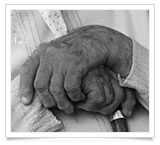by Dr. Leslie (Jack) Fyans
My mother lives in a nursing home in another state and is becoming more erratic in how she reacts to staff there. My siblings and I get calls asking us to “convince” Mom to cooperate when they have to take her to the hospital or to have a procedure. Our brother lives near her, but he’s getting burned out. How can we kids strategize with the nursing home staff to help them and Mom?

Aging often involves conflict and frustration, both for the person aging and his or her caregivers. We all hope to age gracefully, but the journey is not always a smooth one. Faced with your mother’s increasingly “erratic” behavior, you and your siblings may feel frustrated and helpless, especially since you live at a distance. But there are things you can do.
For example, recognize that for your mother, life may seem to be changing in ways she can’t comprehend and at a rate she can’t keep up with. Persons struggling with aging frequently worry about their ability to function in the world. With age, one’s tolerance for change and uncertainty can diminish. Anger, fear, and a sense of powerlessness over one’s circumstances rise more readily to the surface. Often, he or she struggles to make independent decisions, only to be reined in by well-meaning aides, nurses, physicians, and family.
Faced with unanticipated behavior in someone they love, caregivers often become stressed to the point of burnout, questioning themselves and their faithfulness. I encourage you to check out caregiver-support groups in your area to help you cope and to get ideas about how to build bridges of communication with your mother’s nursing home. Identify as your ally one or two people there—perhaps the nurse who works with her most frequently—who are sensitive to your concerns. The chaplain at the facility can be an advocate to the staff on your mother’s behalf and her pastor a source of constancy and connection to her church. Keep talking with others in your family about your frustrations and your hopes. A united front is a tremendous blessing.
It is essential that you also care for yourself. Jesus met others’ needs, but He also took time to pay attention to His own. The Gospels report how He often “withdrew to pray” following episodes when He healed many who were sick. In your ongoing care for your mother, avail yourself of the forgiveness and nourishment at Christ’s table and the fellowship of the worshiping community.
—
About the Author: Dr. Leslie (Jack) Fyans is a clinical psychologist and member of the Ministerial Health Committee of the LCMS Central Illinois District.
December 2010
Questions for “Family Counselor” come from readers and, after steps are taken to assure confidentiality, from contacts made with Lutheran Hour Ministries. Send your questions to “Family Counselor,” The Lutheran Witness, 1333 S. Kirkwood Road, St. Louis, MO 63122-7295. Please include your name and address.


